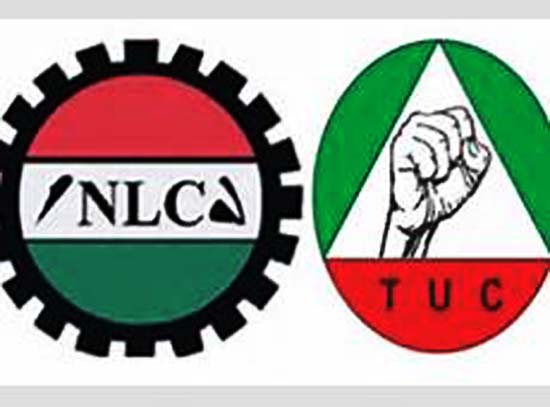
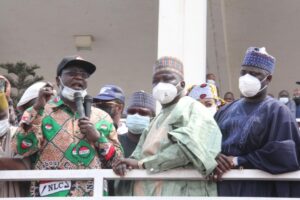
By allcitynews.ng
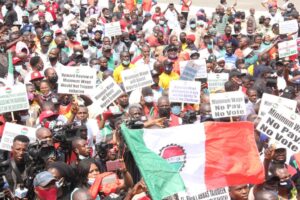
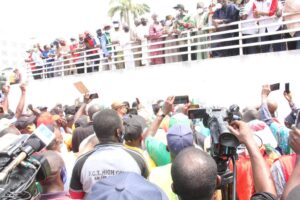
Cross sections of the one led by NLC President, Comrade Ayuba Wabba in Abuja

Wondering how Nigeria should derail from the rest of the world in offering conducive working condition, NLC and TUC pointedly said “Minimum wage laws are in force in about 90% of the countries of the world today including the United States where state minimums are higher than the national minimum. Minimum wage laws prohibit employers from hiring employees or workers for less than a given wage. Closer home, Ghana, Kenya and South Africa (countries with which Nigeria is regularly peer-reviewed) are among countries with national minimum wage laws. Ghana reviews its law every two years. Some countries peg payment of national minimum wage on inflation rate.”
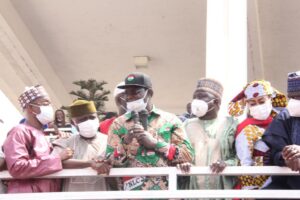
According to the unions, holding to this global labour-governing laws “is in furtherance of Nigeria’s obligation under ILO Convention 026 and in appreciation of best global best practices that the National Minimum Wage is domiciled in the Legislative Exclusive List Section 34 of the 1999 Constitution (as amended). It has been so since 1981.”
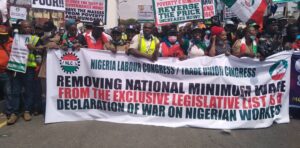
The National Minimum Wage as a Tool for Social Inclusion:
Ability to pay not dependent on surplus resources but on prudence, financial discipline, and the will power
Honourable Speaker, it is important for us to reiterate that the national minimum wage is a product of negotiations between Labour, the Organized Private Sector and Government. During the negotiations, government is represented at both the Federal and State levels. During the negotiations, a number of issues are taken into consideration with data provided by relevant federal and state institutions and agencies. At the end of negotiations, the final outcome or national minimum wage is reasonable, realistic and implementable. Precedence shows that ability to pay is not dependent on surplus resources but on prudence, financial discipline, and the will to pay.
Also, the concept, rationale and logic for a national minimum wage are to ensure that employees in government and organised private sector, but particularly, the unorganised, the unskilled and the vulnerable in the highly ungoverned space commonly referred to as the informal sector, are included and protected.


What will be the implications if
allowed to be signed into law:
By protection, we mean that the vulnerable are not overly exposed or exploited by their employers who pay wages so miserable they create a community of the working poor. Implications of creating communities of the working poor are obvious and range from very grave socio-economic and the political dislocations.
The Implications of Transferring the National Minimum Wage from the Exclusive Legislative List to the Concurrent Legislative List.
Honourable Speaker, the implications of transferring the national minimum wage from the Exclusive Legislative List to the Concurrent Legislative List are very dire. Some of the implications include:
A license for State Governors to drag the country back to the era of ridiculous slave wages which in the past had precipitated multifarious industrial crises in different parts of the country;
The exponential creation and expansion of a community of the working poor with all the attendant consequences for socio-economic cohesion, stability and progress; and also it could lead to the exclusion of the private sector (both organised and unorganised) from the concept, rationale and logic of a national minimum wage, yet, it is in this informal sector that horrendously unfair labour practices take place.
Our Prayer:
Mr. Speaker, we appeal to your good judgement to take account of the gravity of the malevolent scheme afoot by some retrogressive elements in the House of Representatives, intervene to guide the members of the State House of Assembly aright in case this bill comes before you.
Honourable Speaker, if this anti-labour bill that seeks to hamstring the nation in her efforts to reduce poverty and inequality is presented to your State House of Assembly, we appeal to your Excellency to kindly refuse assent.
Organized Labour not willing to sleep on its rights have perfected plans to organize nationwide protests in all the 36 states of the federation and the Federal Capital Territory (FCT) at the National Assembly and the State Houses of Assembly all over Nigeria.
The protest was the first instance in a line of industrial actions to be undertaken by labour to buttress and drive home our point that the retaining of the national minimum wage in the Exclusive Legislative List is a fight for our survival and livelihood of millions of Nigerian workers.

“Please, accept from me, Honourable Speaker, the highest esteem of the Nigerian working people.”
Signed by Chairman and Chairperson of TUC & NLC Lagos State councils.

The protest march was highly peaceful aa security personnel protected against hijacking by hoodlums.

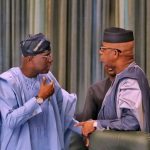




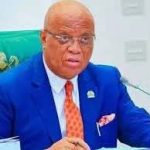
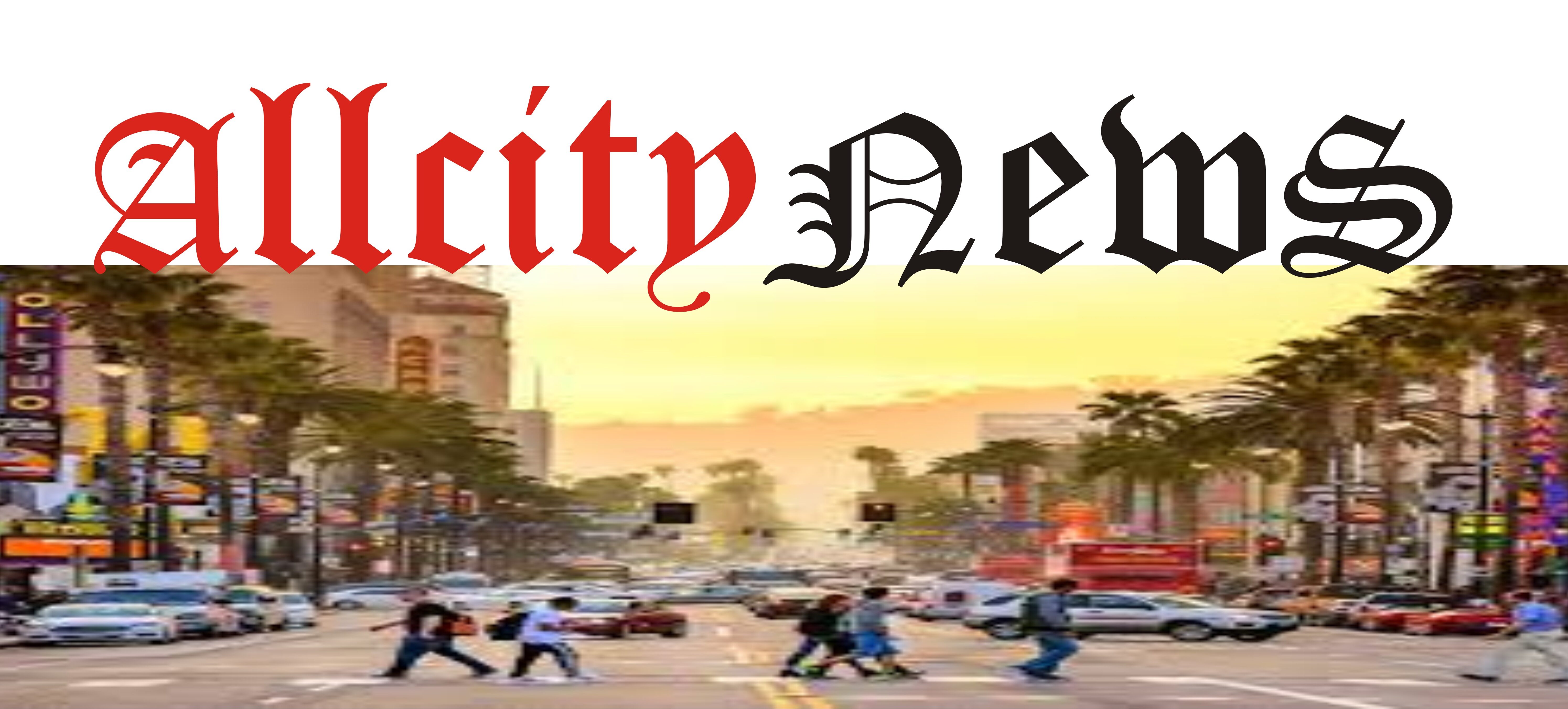

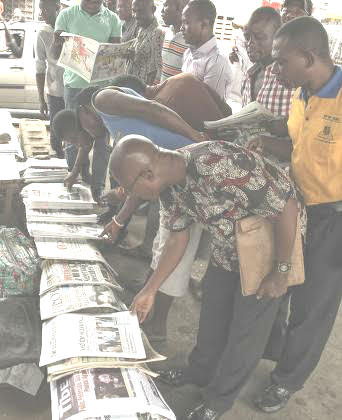


More Stories
Stakeholders advocate inclusion of agricultural, entrepreneurial, skills in School Curriculum
Why judiciary workers set to embark on nationwide strike, June 2
Barely six months of operation, Port Harcourt refinery is shut down for repair work